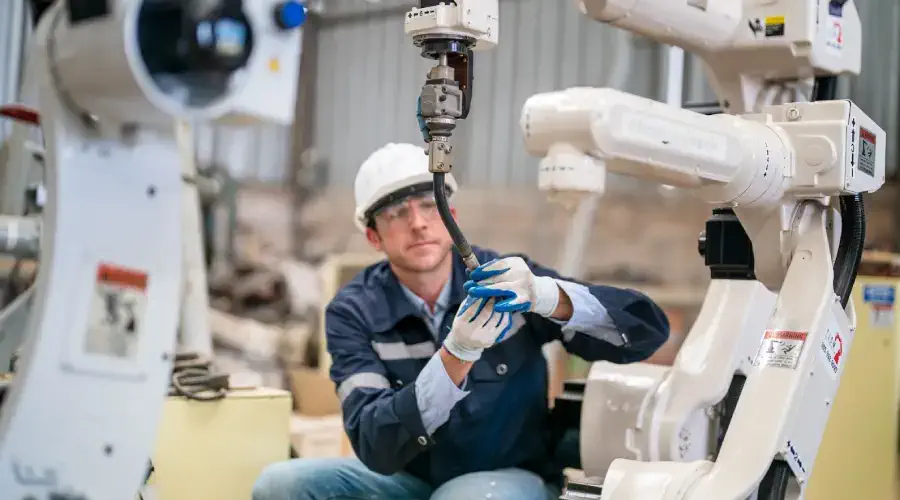Industrial Automation (AI, Robotics, Updated Processes) for Manufacturing and Other Industries

Industrial automation is redefining how modern industries operate. From manufacturing lines and infrastructure development to electrical systems and pipeline control, automation—driven by AI, robotics, and next-gen controls—is optimizing processes, reducing risk, and empowering engineers and project managers to meet increasingly complex demands.
For professionals in engineering, plant operations, pipeline planning, and construction management, understanding the full impact of automation isn’t optional—it’s a competitive advantage. This blog will explore the technologies driving industrial automation, its real-world applications, and how trusted partners like Loenbro can support its implementation across your operations.
Why Industrial Automation Is Reshaping Core Industries
As pressure increases to reduce downtime, enhance safety, and optimize resource use, industrial automation has become a strategic solution across sectors. Intelligent systems don’t just streamline repetitive tasks—they enable predictive decision-making, improve asset utilization, and empower lean operations.
(Source)
Automation doesn’t replace skilled professionals—it gives them better tools to do their jobs more safely and effectively.
Key Benefits of Automation for Engineering and Construction Professionals
Enhanced Performance and Efficiency
“Automated systems improve emergency response times, without placing personnel at risk”
Automated systems work around the clock without fatigue. Whether it’s a robotic welder on a fabrication line or a PLC managing pump flow, these systems ensure precision and speed. For production managers and plant leads, that translates into faster timelines, fewer mistakes, and consistent results.
Predictive Maintenance and System Longevity
With AI-powered monitoring, machines can now alert you before a failure happens. This predictive capability is especially valuable in managing high-stakes assets like electrical substations, control panels, and data center infrastructure. Reducing unplanned downtime supports both safety and profitability.
Increased Safety in High-Risk Environments
Automation handles tasks that are dangerous for humans—such as lifting heavy materials, operating in high-heat zones, or managing energized systems. In pipeline control, for instance, automation allows valves to be shut down remotely at the first sign of a leak, improving emergency response without placing personnel at risk.
Real-Time Data for Smarter Decisions
Engineers and plant managers benefit from immediate insight into system performance. With centralized dashboards and connected sensors, it’s possible to fine-tune production, energy use, and labor allocation on the fly. For those involved in pipeline planning or structural design, that kind of data visibility is a game-changer.
Technologies Driving Industrial Automation Forward
Artificial Intelligence and Machine Learning
AI is at the core of industrial automation’s evolution. It allows systems to “learn” from patterns in usage and environment, enabling dynamic response to changes. For example, AI-driven controls can optimize energy distribution in real time—crucial in industrial automation controls where electrical loads shift constantly.
Robotics and Cobots
Robots handle welding, assembly, inspection, and other repetitive or high-risk tasks. Collaborative robots, or “cobots,” work safely alongside human operators, increasing output without increasing hazards. They are especially beneficial in environments like modular construction and manufacturing, where repetitive precision is critical.
PLCs, SCADA, and Remote Monitoring
Programmable Logic Controllers (PLCs) and SCADA systems automate everything from HVAC and lighting to flow control and security systems. They give operations personnel and remote operations full visibility and control from centralized or even remote locations—essential for managing remote pipelines, skids, or lift systems.
Industrial Internet of Things (IIoT)
Smart sensors embedded in machinery, equipment, and infrastructure provide continuous data on vibration, pressure, temperature, and other variables. IIoT-enabled systems support predictive maintenance, quality assurance, and compliance documentation—all without manual intervention.
Where Industrial Automation Delivers Maximum Impact
Pipeline Infrastructure and Remote Sites
Pipeline planning specialists are increasingly deploying smart controls to monitor pressure, temperature, and flow—helping prevent leaks, manage resources, and streamline emergency response.
Data Center Electrical and Mechanical Systems
In facilities where uptime is critical, automation helps maintain consistent power loads, manage heat dissipation, and perform system self-checks—reducing the risk of failure and human error.
Fabrication and Welding Operations
Robotic welders and CNC machinery ensure consistency and reduce waste during high-volume production. This improves throughput and quality while allowing skilled technicians to focus on supervision and programming.
Industrial Construction and Equipment Placement
Automated lift systems and motorized skids allow for safer equipment setting and structural assembly. Sensors track torque, stress, and alignment to ensure everything is installed to spec, reducing rework and improving safety.
How Loenbro Supports Automation Implementation

Designing and deploying effective industrial automation systems requires hands-on expertise and multi-discipline coordination. That’s where Loenbro delivers.
Loenbro’s team specializes in:
- Custom industrial automation controls and integration
- Electrical services for power distribution, fabrication, and data systems
- Mechanical settings, skids, and equipment placement for automated processes
- SCADA and PLC deployment, calibration, and optimization
- Full lifecycle support—from planning and install to long-term maintenance
Whether you’re building new facilities, upgrading outdated systems, or expanding pipeline networks, Loenbro helps your team meet automation goals with reliability, safety, and precision.
Final Thoughts: Embracing the Future of Automation
Industrial automation isn’t just a technology trend—it’s a foundational shift in how infrastructure, manufacturing, and energy systems are designed and operated. For engineers, project managers, and plant operators, automation unlocks new levels of control, visibility, and performance.
Bring Precision to Your Next Electrical Project
Ready to enhance your manufacturing processes with automation? Loenbro combines advanced automation technology and expert craftsmanship to deliver high-volume, high-precision manufacturing—faster, safer, and more efficiently. Whether you need structural steel components, custom skids, or automated welding solutions, our team helps you build smarter from the ground up. Explore Loenbro’s critical electrical services and see how automation and expertise come together to move your project forward.

